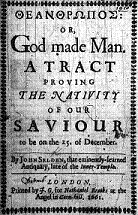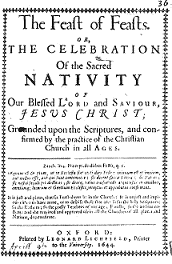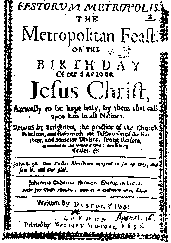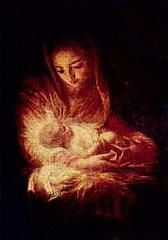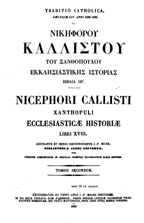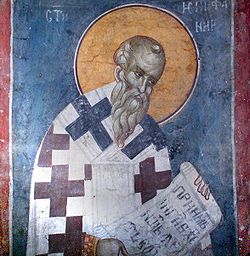Gregory Thaumaturgus
Testimony of Early Belief in the Christmas Date
Gregory Thaumaturgus (A.D. 205-265) was
born to pagan parents, and was a native of Neo-Caesarea, the
first city of Pontus. He became a student of Origen in
Palestinian Caesarea, where he was instructed in logic,
geometry, physics, philosophy, and ancient literature. Under
Origen’s influence, Gregory soon converted to the faith. After
about five years of remaining with Origen, Gregory returned to
his native Neo-Caesarea, where he became bishop and served with
great distinction. The passage in question has to do with the
annunciation and conception, which Gregory places at Passover,
which occurs at the full moon in the month of Nisan (Abib).
Since Gregory almost certainly equated Passover the year Christ
was conceived with March 25th, the nativity nine
months later would have been December 25th, making
this one of the earliest evidences of the traditional date of
Christ’s birth:
|
“‘And in the sixth month the
angel Gabriel was sent to a virgin espoused to a man
whose name was Joseph, of the house and lineage of
David; and the virgin’s name was Mary;’ and so forth.
And this was the first month to the holy Virgin. Even as
Scripture says in the book of the law: ‘This month shall
be unto you the beginning of months: it shall be the
first month among the months of the year to you.’ ‘Keep
ye the feast of the holy Passover to the Lord in all
your generations.’ It was also the sixth month to
Zacharias”[1] |
The passage is from the second of four
sermons delivered at the feast commemorating the Annunciation.
The sermons come down to us in Gregory’s name, but were judged
by 18th century patristic scholars of doubtful or unknown
(“spurious”) authorship, and continue under the cloud of that
aspersion until today. The objection to Gregory’s authorship is that the
date of March 25th for the annunciation was allegedly
derived from the December 25th nativity, which (it is
argued) was not celebrated in the east until introduced there by
Chrysostom in A.D. 386, so that the feast of the annunciation
must originate later still. Also, the sermons make repeated use
of the phrase “mother of God” in reference to Mary, which is
asserted to be an anachronism belonging to a later time.
Against these objections it may be observed that scholars believe the March 25th—December 25th—March 25th triad of conception—nativity—passion/resurrection was already extant in Gregory’s day, as evidenced by the writings of Julius Africanus and others. Africanus, who was hugely influential as the earliest Christian chronographer, was a contemporary of Origen and corresponded with him, so it is unlikely that Gregory should fail to have been exposed to Africanus’ views. Moreover, the March 25th passion is based upon the so-called “short chronology” of Jesus’ ministry of one year and several months, which early writers saw in the synoptic gospels. Jesus was baptized in the fall of A.D. 29, the fifteenth year of Tiberius; the short chronology would place his crucifixion in the spring of A.D. 31 when Passover was on March 25th. Since Origen and Origen’s teacher, Clement Alexandria, were both adherents of the short chronology,[2] there is good cause to believe Gregory would have held to it also. And if he held to this part of the triad, why may we not conclude he embraced the remainder of it as well? And even if the December 25th nativity was not received in Antioch until the time of Chrysostom, there is nothing to prevent Gregory from having preached the sermons in question in Neo-Caesarea. Indeed, Chrysostom states that the December 25th celebration of Christ’s nativity was kept from “the beginning” in Thrace, which was a close neighbor to Pontus, so that its late arrival in Antioch offers no objection to its early arrival elsewhere.[3] That the feast of the annunciation may find its origins this early finds confirmation in the fact that the feast of the Purification was celebrated very little afterward (about 60 years) as witnessed by Methodius (A.D. 260-312) in his Oration Concerning Simeon and Anna, where we encounter repeated occurrence of the phrase “mother of God” in reference to Mary, so that this objection comes to nothing also.[4] As to which is more likely to have been celebrated earlier, the annunciation and conception, or purification and presentment, surely the former has the stronger claim, for without it there could never have been the latter. On the whole then, there is no good reason to reject history’s witness attributing the subject homilies to Gregory, or the conclusion that he subscribed to the March 25th—December 25th—March 25th triad already current in his day.
[1] “Second
Homily on the Annunciation to the Holy Virgin Mary” in
Ante-Nicene Fathers, eds. Alexander Roberts and James Donaldson
(Christian Literature Publishing, 1885), 6:63.
[2]
Clement Alexandria,
Stromata 1.21;
Origen, De
Principiis 4.5.
[3] “From the
beginning it became very manifest and famous with those
living from Thrace to Gades” (John Chrysostom,
On the Day of the
Birth of Our Savior Jesus Christ).
[4] Methodius,
“Oration Concerning Simeon and Anna” in
Ante-Nicene
Fathers, eds. Alexander Roberts and James Donaldson
(Christian Literature Publishing, 1885), 6:385.
______________________________
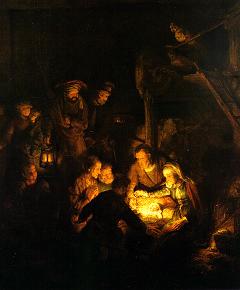
Adoration of the Shepherds
All rights reserved.
 John Seleden’s
John Seleden’s